Vladimir Putin's right-hand woman is Valentina Matviyenko, a Ukrainian-born politician who passionately supports his war
By Rebecca Armitage for the ABC
As Vladimir Putin's plan to invade Ukraine gained momentum in February this year, he called a surprise meeting of his inner circle.
LONG READ
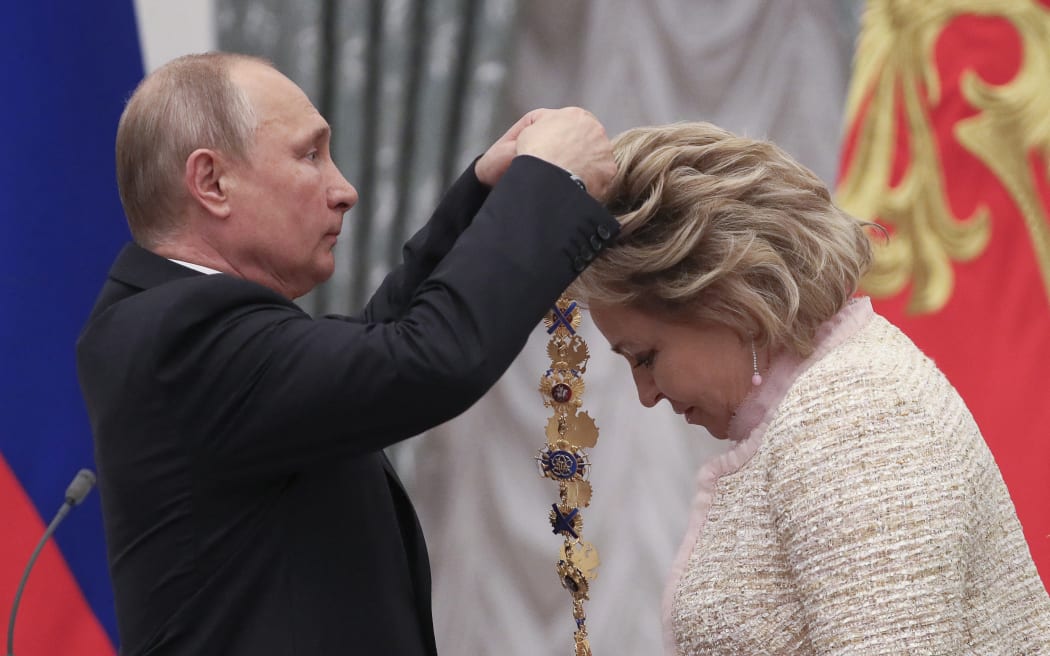
Russia's President Vladimir Putin awards the Order of St Andrew the Apostle to chairwoman of the Federation Council Valentina Matviyenko during a ceremony at the Kremlin in Moscow on 23 May 2019. Photo: AFP
The Russian President sat glowering behind a desk while members of his National Security Council squirmed on little chairs like schoolchildren.
One by one, Vladimir Putin demanded they come forward and tell him what they thought about his decision to send what he called "peacekeepers" into the separatist Ukrainian regions of Donetsk and Luhansk.
As the cameras rolled, they spoke. Some were enthusiastic. Others stammered as they tried to explain their position, prompting Putin to snap repeatedly: "Speak directly!"
But the sole woman in the room walked confidently to the lectern.
With her coiffed blonde bob and Chanel-inspired boucle skirt suit, Valentina Matviyenko has long been accustomed to standing out in meetings full of men.
But where some equivocated, the chairwoman of the Federation Council was strident.
"A humanitarian catastrophe has been unfolding before our eyes in the centre of Europe," she claimed without evidence.
She made baseless allegations that a "puppet" regime ruled Ukraine, responsible for "genocide" and mysteriously burned bodies in Odesa.
And borrowing one of Putin's favourite talking points, she said the West was "trying to pit the two Slavic fraternal nations against each other".
She concluded with a plea to Vladimir Putin.
"I believe it is time to make a decision," she said.
"It is simply immoral to continue discussing it to death and dragging it out while pretending that something is being done."
With the thanks of her president, Matviyenko returned to her chair.
At no point did she seem fazed that she was asking the president of Russia to invade her homeland.
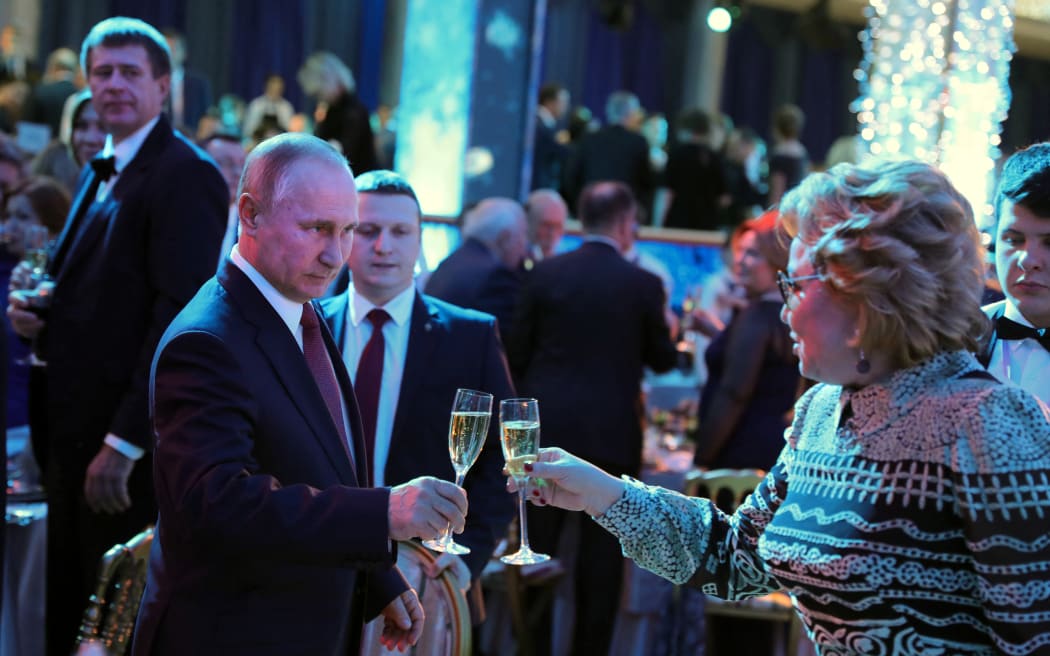
Russian President Vladimir Putin at the reception to mark the New Year holiday at the Kremlin, seen with Federation Council Speaker Valentina Matviyenko on 27 December, 2017. Photo: Sputnik via AFP
Valentina Matviyenko was born in Shepetivka, west of Kyiv, when Ukraine was still part of the Soviet Union.
But her decision to study chemistry as a young university student in Russia's historic imperial capital changed her life.
It put her right in the path of a young KGB agent-turned-politician who would help her become the most powerful woman in Russia since Catherine the Great.
In Putin's Russia, you're nobody unless you're from St Petersburg
Throughout his long reign, Vladimir Putin has projected an image of a solitary, almost monk-like figure who toils, as he puts it, "like a galley slave" for Russia.
Even his former wife, his children and his rumoured new partner never appear publicly by his side.
But in reality, he has surrounded himself with a close-knit group of allies, many of whom he has known since his 20s.
Like others in Putin's inner circle, Valentina Matviyenko got her start in politics in the 1970s in St Petersburg, back when it was known as Leningrad.
"I was not eager for politics," she admitted to Russian media in 2019.
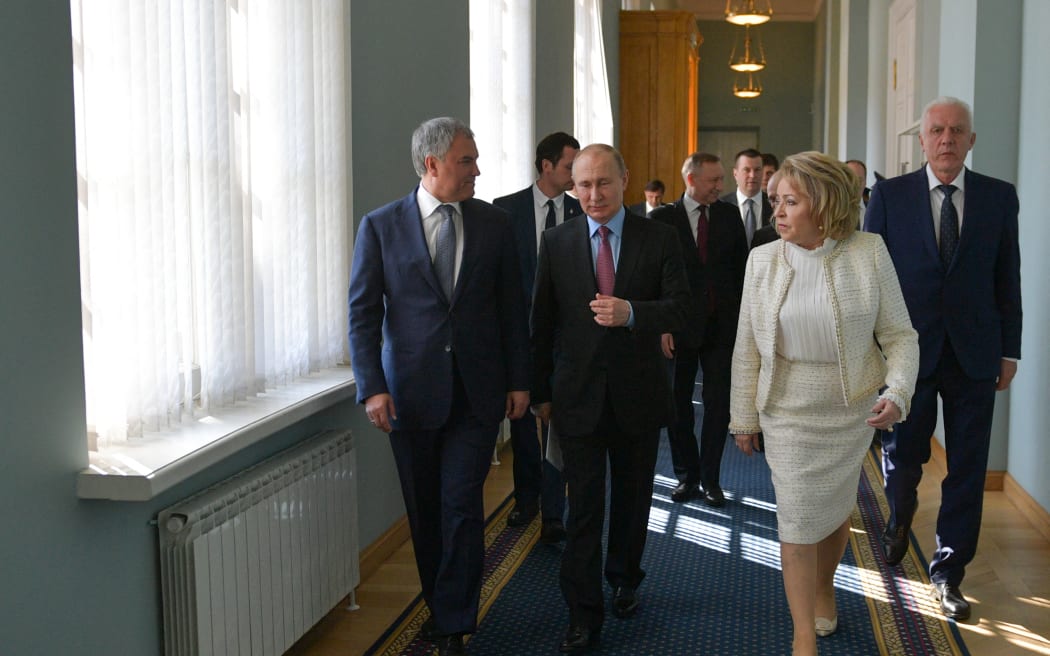
From left: State Duma Speaker Vyacheslav Volodin, Russian President Vladimir Putin, Federation Council Speaker Valentina Matvienko and Presidential Envoy to North-East federal district Alexander Gutsan arrive for a meeting with members of Lawmakers Council in St.Petersburg, Russia on 24 April, 2019. Photo: Sputnik via AFP
While studying to be a scientist, leaders of the youth division of St Petersburg's Soviet Communist Party asked her to join their organisation.
When she refused because she wanted to focus on her science career, they called the head of her graduate program.
"They said 'we do not need irresponsible people either in science or in graduate school'," she recalled.
By the time she met Vladimir Putin, Matviyenko was already a local political heavyweight, if perhaps a reluctant one.
At a time when Soviet women were there to be seen, not heard, she swiftly earned herself the nickname "Valka the glass" for her ability to drink her male comrades under the table.
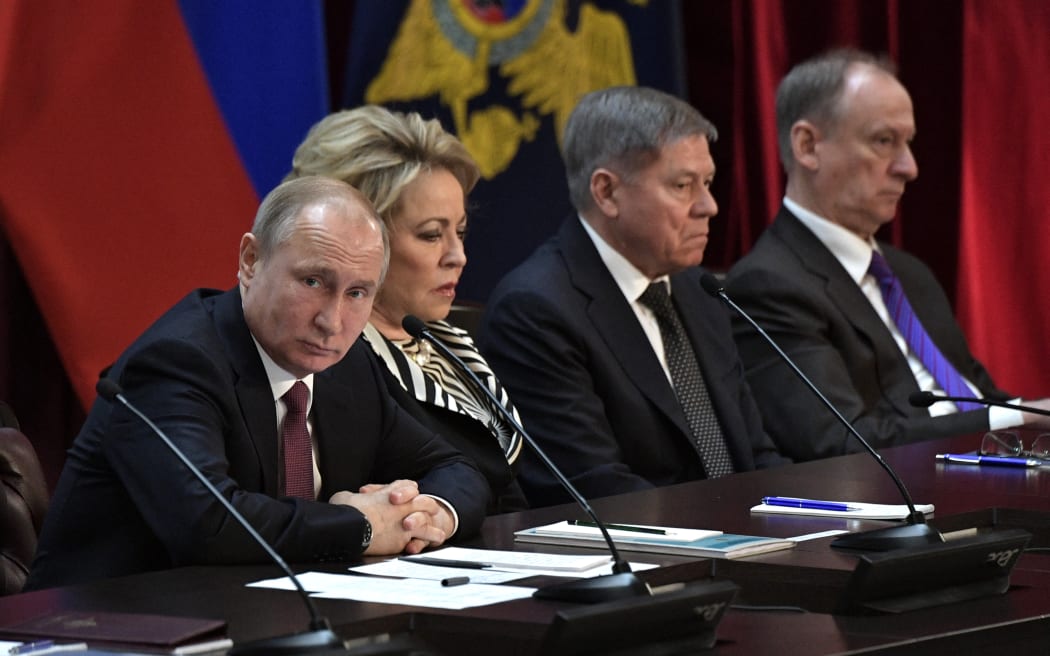
From left: Russian President Vladimir Putin, Chairperson of the Federation Council Valentina Matvienko, Chairman of the Supreme Court of the Russian Federation Vyacheslav Lebedev and Russia's Security Council Secretary Nikolai Patrushev at the annual expanded meeting of the Russian Interior Ministry Board on 28 February, 2019. Photo: Sputnik via AFP
Her career skyrocketed and she became the USSR's youngest female MP and the chairwoman of the Supreme Soviet Committee on Women, Families, Maternity and Childhood.
But when the Soviet Union collapsed in 1991, she had a tricky choice to make if she wanted to survive the ensuing decade of chaos and maintain her power.
As Russia's president Boris Yeltsin descended into alcoholism and deep unpopularity, there were two potential successors waiting in the wings.
One was Yeltsin's own prime minister, Yevgeny Primakov, an extremely popular politician, with whom Matviyenko was close.
The other was Vladimir Putin, then the director of the country's post-Soviet intelligence agency and virtually unknown to the Russian public.
What few knew at that stage was that Putin had been tapped by Yeltsin's family for mysterious reasons to be Russia's next leader.
Armed with a dossier of kompromat - the KGB term for damaging intelligence - Vladimir Putin was able to swiftly and quietly knock his rivals out of contention.
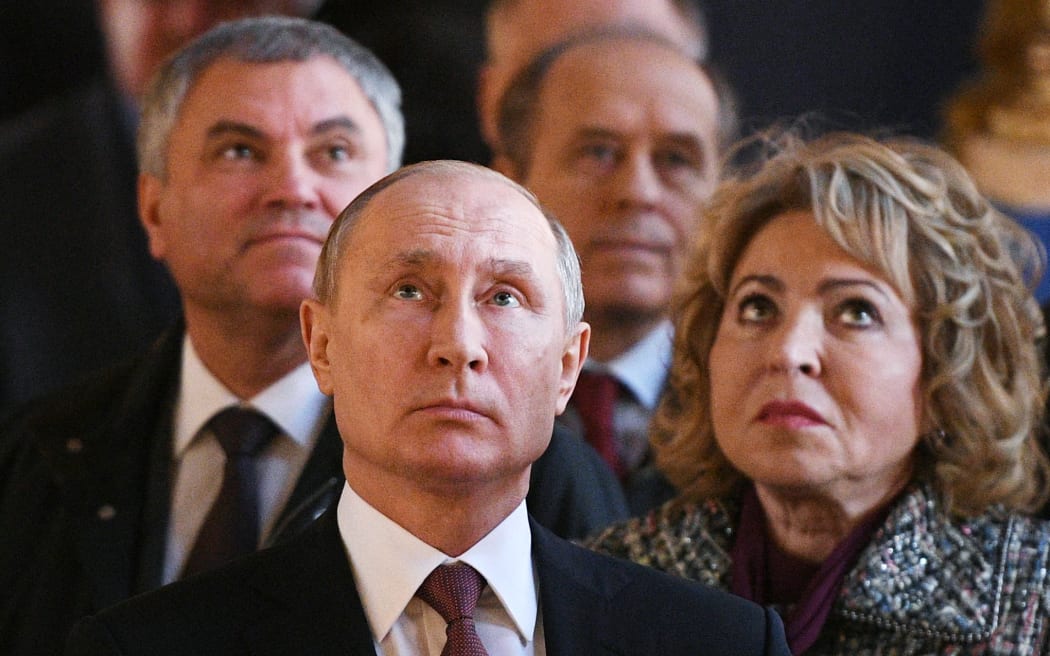
Russian President Vladimir Putin and Valentina Matviyenko visits the Church of Jesus Resurrection of Catherine Palace at the Tsarskoe Selo State Museum in Pushkin, near St. Petersburg, Russia on 10 April, 2019. Photo: Sputnik via AFP
While Valentina Matviyenko was encouraged to run for the presidency, she refused, instead switching her allegiance to Putin.
"I think she's a political animal," said Dr Sara Meger, a lecturer in International Relations in the School of Social and Political Sciences at Melbourne University.
"I think it's no secret that it's pretty dangerous to be an opponent to Putin during his long reign in power."
With Putin sweeping aside Soviet-era power players and replacing them with KGB colleagues and old friends from St Petersburg, Matviyenko's loyalty was quickly rewarded.
The most powerful Russian woman since Catherine the Great
With the endorsement of Putin, Valentina Matviyenko ran to be governor of their hometown in 2003.
Her rivals festooned the streets with banners claiming: "Being governor is no job for a woman."
But in the end, she won with a commanding majority.
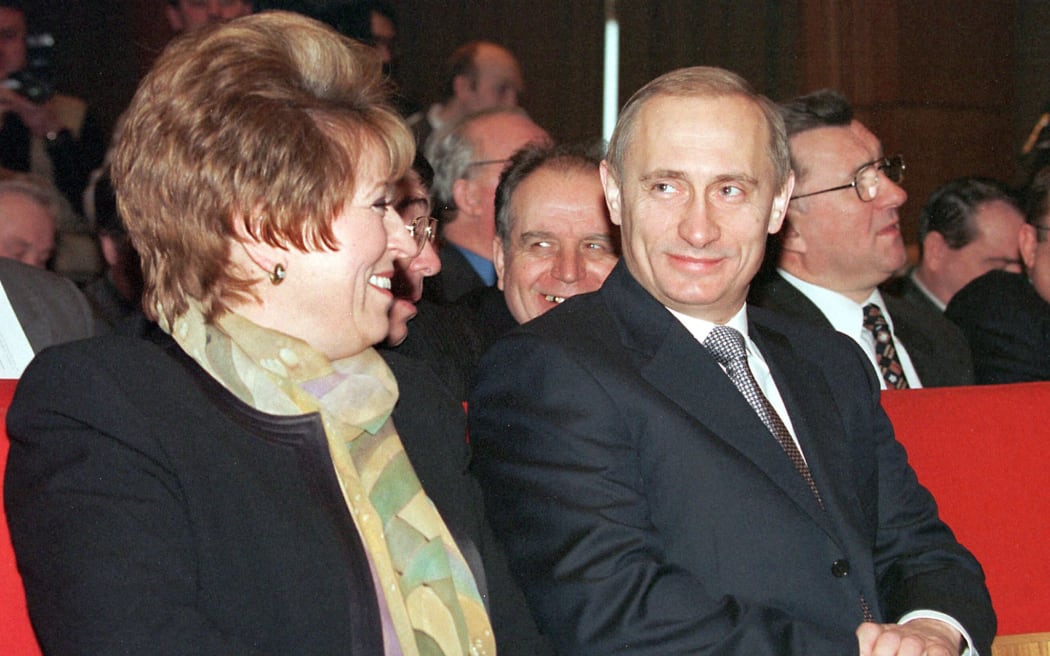
Russian acting President Vladimir Putin (R) and Vice Premier Valentina Matviyenko (L) smile during the session of the trade unions general council, Moscow 16 February, 2000. Photo: AFP
The girl from rural Ukraine who went to St Petersburg for a better life found herself ruling over the 300-year-old city.
Under her leadership, the dilapidated region flourished: New developments sprung up, the birthrate doubled for the first time since the collapse of the USSR and tourism increased.
Her critics claim that it was around this time she got rich - seriously rich.
An investigative group run by Vladimir Putin's arch rival, Alexei Navalny, linked a huge luxury villa sitting on Italy's east coast to her family.
"Where could a Russian official get the money for this?" the group's chief investigator, Maria Pevchikh, asked.
"That's the main secret of Putin's Russia: If you love Putin, money will flow on you like water."
But the biggest prize was yet to come.
In 2011, she ascended to heights not reached by a Russian woman since Empress Catherine the Great in 1762.
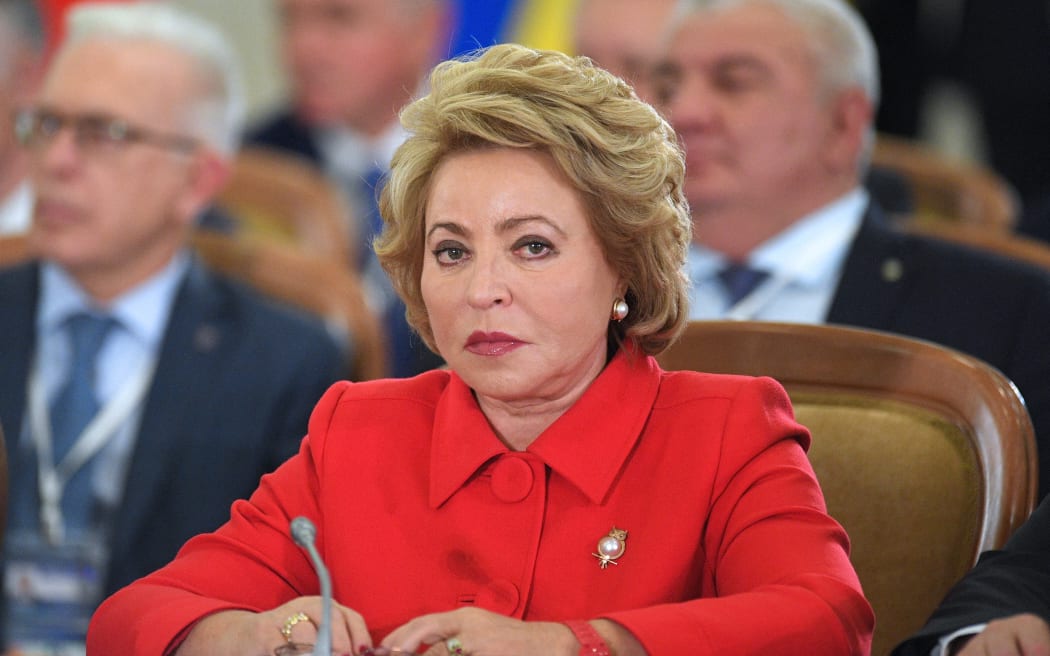
Speaker of the Federation Council of Russia Valentina Matviyenko at an expanded meeting of the CIS Council of Heads of State in Sochi on 11 October, 2017. Photo: Sputnik via AFP
She was made speaker of Russia's Federation Council, after winning a seat in the upper house of parliament.
That made Valentina Matviyenko the third most powerful person in Russia.
Her astounding landslide victory - with 95 percent of the vote - was dismissed as "100 percent fraud" by opposition leaders.
And it would be from these lofty heights that her connection to her humble past would be put to the ultimate test.
A possible successor to Vladimir Putin?
When Vladimir Putin sent troops into the country of her birth, Valentina Matviyenko was right by his side.
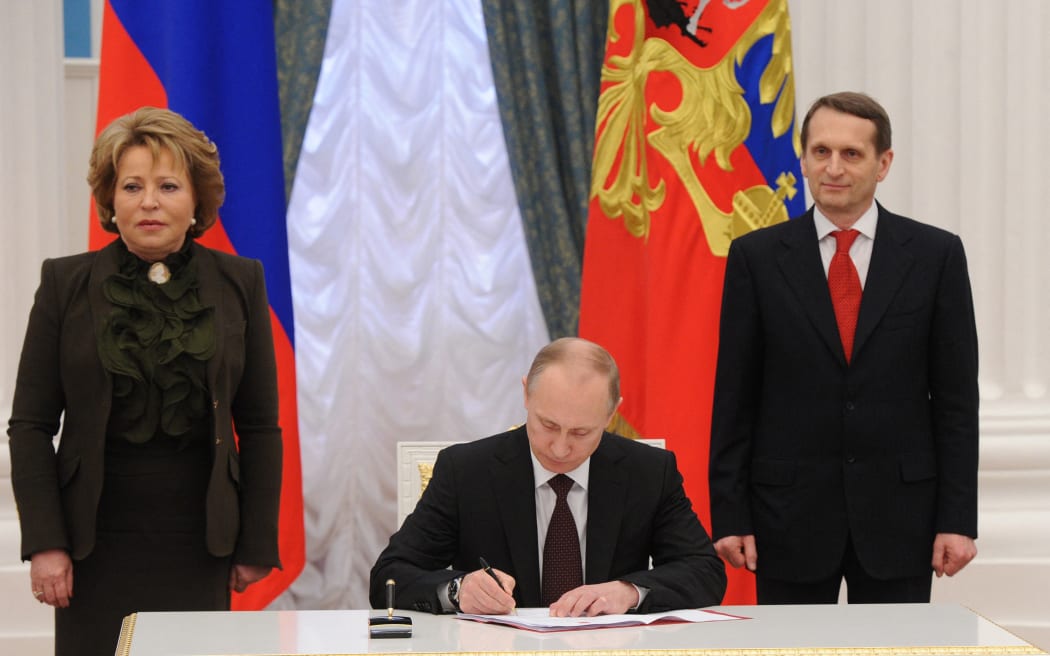
Sergey Naryshkin (R) Chairman of the State Duma and Valentina Matviyenko (L) the Chairwoman of the Federation Council of the Russian Federation stand next to the Russian President Vladimir Putin as he signs set of laws on reunification of Crimea, Sevastopol with Russia at Ekaterininsky in Kremlin, 21 March, 2014. Photo: AFP
For Dr Meger, it's not a surprising move for a woman of her generation.
"I think we could probably read into her politics and life trajectory as feeling more allegiance to the Soviet Union," she said.
"Older Ukrainians are a lot less optimistic than younger Ukrainians about independence and the turn towards Europe.
"There's a lot more Soviet nostalgia and a belief that things were better under the Soviet Union."
And, as a woman who has survived five decades in one of the most chaotic power structures in the world, Matviyenko has learned how to keep herself in the inner circle.
"She has long been tipped as perhaps the successor to Putin for the Russian presidency, or at least having some sort of major role in Russian politics," Dr Meger said.
"So to her, it's strategic to keep telling the Putin line."
Whether Russia could ever see a president Matviyenko is unclear, according to Dr Meger.
"I think that Russian society certainly would be open to it. I don't think the men of the inner sanctum would allow it," she said.
"She's the eldest of that inner circle. So I imagined that by the time Putin is retiring, or somehow ousted from power, there will be some significant, more youthful challenger."
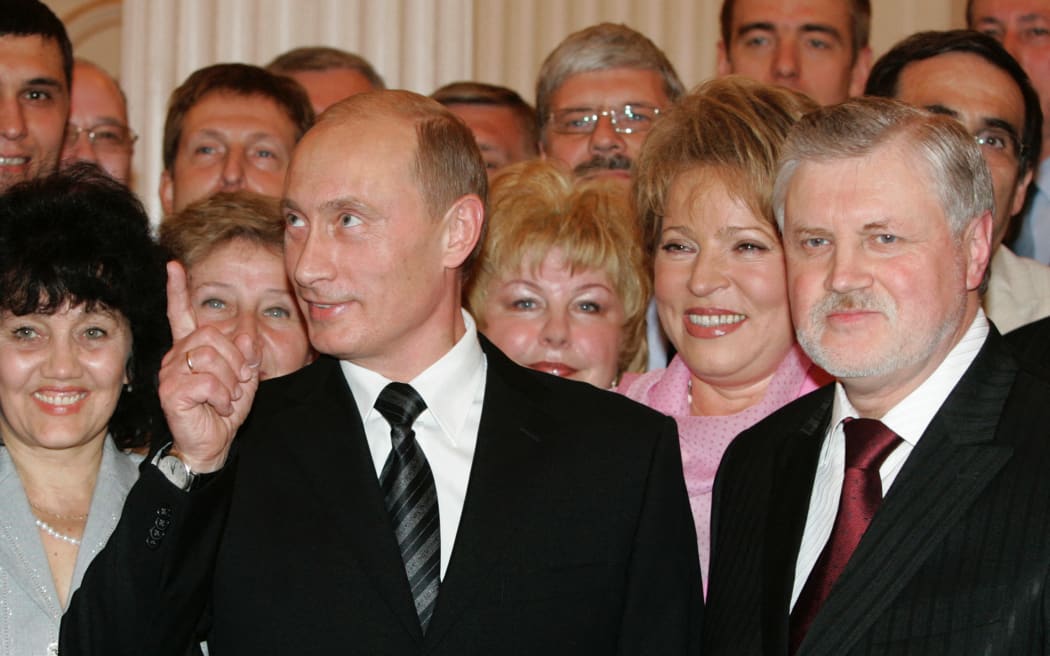
Russian President Vladimir Putin, Sergei Mironov, chairman of the Federation Council (from left to right, foreground) and St. Petersburg Governor Valentina Matviyenko (first right) after a ceremonial presenting of the certificate and badge of honorary citizen of St. Petersburg in the Mariinsky Palace in 2006. Photo: Sputnik via AFP
Still, Valentina Matviyenko has spent her life being underestimated.
When speaking to the press, she regularly jokes that women are better suited to hold power than men.
"It seems that male politicians with their brutal style have not coped with managing the world. They allowed wars, conflicts, violence," she said in 2019.
"This is, of course, a joke. But, as we say in Russia, there is some truth in every joke."


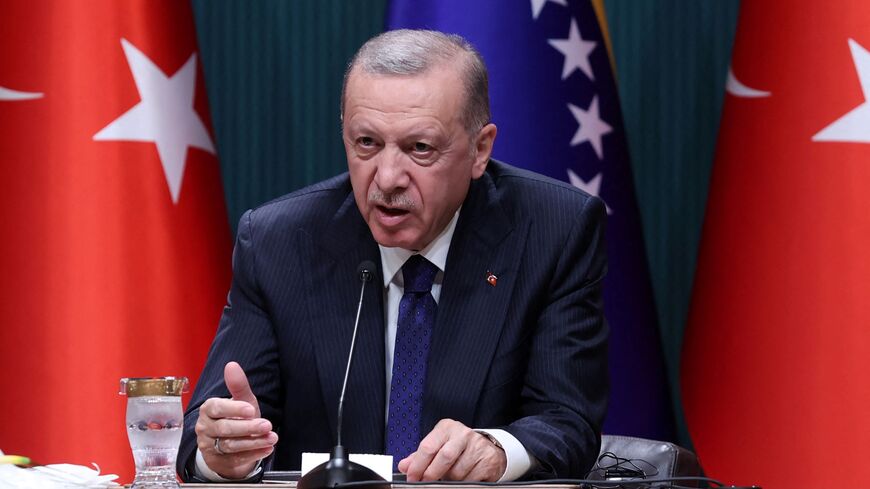









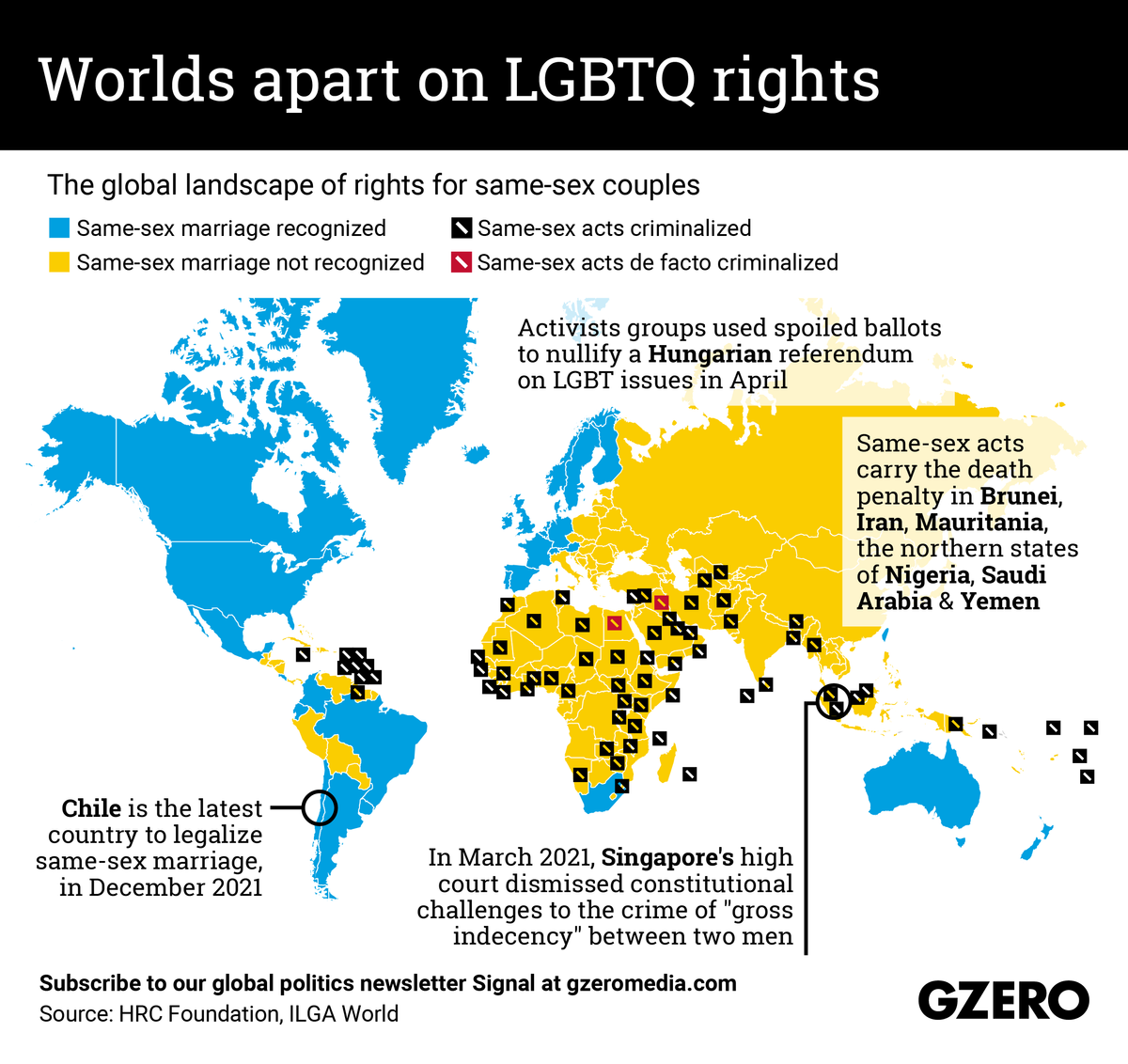
/cloudfront-ap-southeast-2.images.arcpublishing.com/nzme/D3BEROIPDNBJNXUOEJ6TM3AVCI.jpg)
/cloudfront-ap-southeast-2.images.arcpublishing.com/nzme/BJMQXWAAVRQCNY7RUULTROX2PE.jpg)